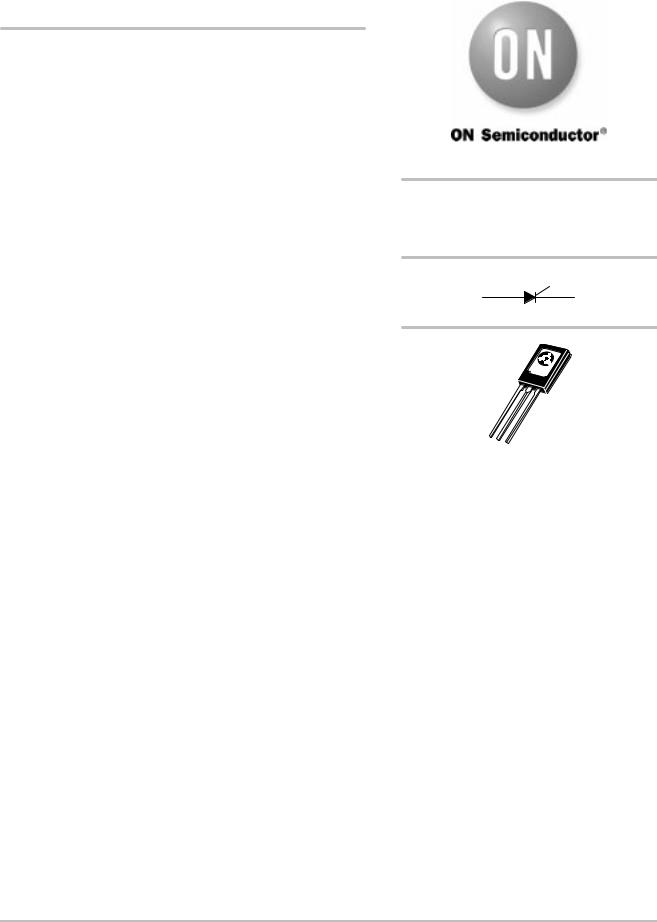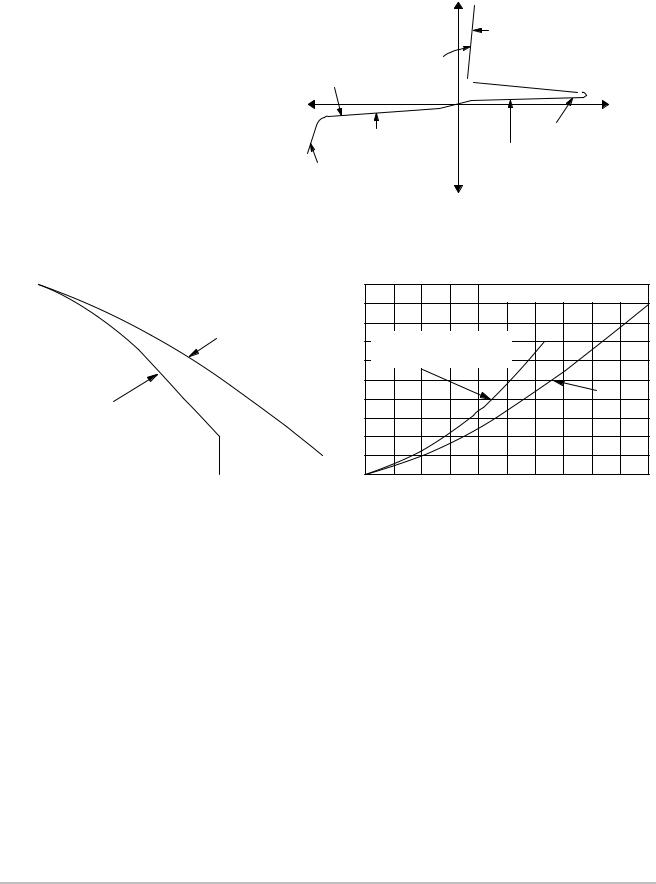ON Semiconductor C106M1, C106M, C106D1, C106D, C106B Datasheet

C106 Series
Preferred Devices
Sensitive Gate
Silicon Controlled Rectifiers
Reverse Blocking Thyristors
Glassivated PNPN devices designed for high volume consumer applications such as temperature, light, and speed control; process and remote control, and warning systems where reliability of operation is important.
•Glassivated Surface for Reliability and Uniformity
•Power Rated at Economical Prices
•Practical Level Triggering and Holding Characteristics
•Flat, Rugged, Thermopad Construction for Low Thermal Resistance, High Heat Dissipation and Durability
•Sensitive Gate Triggering
•Device Marking: Device Type, e.g., C106B, Date Code
MAXIMUM RATINGS (TJ = 25°C unless otherwise noted)
Rating |
Symbol |
Value |
Unit |
|
|
|
|
Peak Repetitive Off±State Voltage (Note 1) |
VDRM, |
|
Volts |
(Sine Wave, 50±60 Hz, RGK = 1 kΩ, |
VRRM |
|
|
TC = ±40° to 110°C) |
|
|
|
C106B |
|
200 |
|
C106D, C106D1 |
|
400 |
|
C106M, C106M1 |
|
600 |
|
|
|
|
|
On-State RMS Current |
IT(RMS) |
4.0 |
Amps |
(180° Conduction Angles, TC = 80°C) |
|
|
|
Average On±State Current |
IT(AV) |
2.55 |
Amps |
(180° Conduction Angles, TC = 80°C) |
|
|
|
Peak Non-Repetitive Surge Current |
ITSM |
20 |
Amps |
(1/2 Cycle, Sine Wave, 60 Hz, |
|
|
|
TJ = +110°C) |
|
|
|
Circuit Fusing Considerations (t = 8.3 ms) |
I2t |
1.65 |
A2s |
Forward Peak Gate Power |
PGM |
0.5 |
Watt |
(Pulse Width 1.0 μsec, TC = 80°C) |
|
|
|
Forward Average Gate Power |
PG(AV) |
0.1 |
Watt |
(Pulse Width 1.0 μsec, TC = 80°C) |
|
|
|
Forward Peak Gate Current |
IGM |
0.2 |
Amp |
(Pulse Width 1.0 μsec, TC = 80°C) |
|
|
|
Operating Junction Temperature Range |
TJ |
±40 to |
°C |
|
|
+110 |
|
|
|
|
|
Storage Temperature Range |
Tstg |
±40 to |
°C |
|
|
+150 |
|
|
|
|
|
Mounting Torque (Note 2) |
± |
6.0 |
in. lb. |
|
|
|
|
1.VDRM and VRRM for all types can be applied on a continuous basis. Ratings apply for zero or negative gate voltage; however, positive gate voltage shall not be applied concurrent with negative potential on the anode. Blocking voltages shall not be tested with a constant current source such that the voltage ratings of the devices are exceeded.
2.Torque rating applies with use of compression washer (B52200F006).
Mounting torque in excess of 6 in. lb. does not appreciably lower case-to-sink thermal resistance. Anode lead and heatsink contact pad are common.
http://onsemi.com
SCRs
4 AMPERES RMS
200 thru 600 VOLTS
 G
G
A
 K
K
3 2 |
1 |
|
TO±225AA |
(formerly TO±126) |
|
|
CASE 077 |
|
STYLE 2 |
|
PIN ASSIGNMENT |
|
|
1 |
Cathode |
|
|
2 |
Anode |
|
|
3 |
Gate |
|
|
|
|
ORDERING INFORMATION
Device |
Package |
Shipping |
|
|
|
C106B |
TO225AA |
500/Box |
|
|
|
C106D |
TO225AA |
500/Box |
|
|
|
C106D1 |
TO225AA |
500/Box |
C106M |
TO225AA |
500/Box |
|
|
|
C106M1 |
TO225AA |
500/Box |
|
|
|
|
|
|
Preferred devices are recommended choices for future use and best overall value.
Semiconductor Components Industries, LLC, 2002 |
1 |
Publication Order Number: |
March, 2002 ± Rev. 4 |
|
C106/D |

C106 Series
THERMAL CHARACTERISTICS (TC = 25°C unless otherwise noted.)
Characteristic |
|
|
|
|
Symbol |
|
Max |
|
|
Unit |
||
|
|
|
|
|
|
|
|
|
|
|
|
|
Thermal Resistance, Junction to Case |
|
|
|
|
RθJC |
3.0 |
|
|
°C/W |
|||
Thermal Resistance, Junction to Ambient |
|
|
|
|
RθJA |
75 |
|
|
°C/W |
|||
Maximum Lead Temperature for Soldering Purposes 1/8″ from Case for 10 Seconds |
|
TL |
260 |
|
|
|
°C |
|||||
ELECTRICAL CHARACTERISTICS (TC = 25°C unless otherwise noted.) |
|
|
|
|
|
|
|
|
|
|
||
|
|
|
|
|
|
|
|
|
|
|
||
Characteristic |
|
|
Symbol |
|
Min |
|
Typ |
Max |
|
Unit |
||
|
|
|
|
|
|
|
|
|
|
|
|
|
OFF CHARACTERISTICS |
|
|
|
|
|
|
|
|
|
|
|
|
|
|
|
|
|
|
|
|
|
|
|
||
Peak Repetitive Forward or Reverse Blocking Current |
TJ = 25°C |
|
IDRM, IRRM |
|
|
|
|
|
|
mA |
||
(VAK = Rated VDRM or VRRM, RGK = 1000 Ohms) |
|
|
|
|
± |
|
± |
10 |
|
|||
|
TJ = 110°C |
|
|
|
|
± |
|
± |
100 |
|
mA |
|
ON CHARACTERISTICS |
|
|
|
|
|
|
|
|
|
|
|
|
|
|
|
|
|
|
|
|
|
|
|||
Peak Forward On±State Voltage (Note 3) |
|
|
VTM |
|
± |
|
± |
2.2 |
|
Volts |
||
(ITM = 4 A) |
|
|
|
|
|
|
|
|
|
|
|
|
Gate Trigger Current (Continuous dc) (Note 4) |
TJ = 25°C |
|
IGT |
|
|
|
|
|
|
|
mA |
|
(VAK = 6 Vdc, RL = 100 Ohms) |
|
|
|
|
± |
|
15 |
200 |
|
|
||
|
TJ = ±40°C |
|
|
|
|
± |
|
35 |
500 |
|
|
|
Peak Reverse Gate Voltage (IGR = 10 mA) |
|
|
VGRM |
|
± |
|
± |
6.0 |
|
Volts |
||
Gate Trigger Voltage (Continuous dc) (Note 4) |
TJ = 25°C |
|
VGT |
|
|
|
|
|
|
|
Volts |
|
(VAK = 6 Vdc, RL = 100 Ohms) |
|
|
|
|
0.4 |
|
0.60 |
0.8 |
|
|
||
|
TJ = ±40°C |
|
|
|
|
0.5 |
|
0.75 |
1.0 |
|
|
|
Gate Non±Trigger Voltage (Continuous dc) (Note 4) |
|
|
VGD |
|
0.2 |
|
± |
± |
|
Volts |
||
(VAK = 12 V, RL = 100 Ohms, TJ = 110°C) |
|
|
|
|
|
|
|
|
|
|
|
|
Latching Current |
TJ = 25°C |
|
IL |
|
|
|
|
|
|
|
mA |
|
(VAK = 12 V, IG = 20 mA) |
|
|
|
|
± |
|
0.20 |
5.0 |
|
|
||
|
TJ = ±40°C |
|
|
|
|
± |
|
0.35 |
7.0 |
|
|
|
Holding Current (VD = 12 Vdc) |
TJ = 25°C |
|
IH |
|
|
|
|
|
|
|
mA |
|
(Initiating Current = 20 mA, Gate Open) |
|
|
|
|
± |
|
0.19 |
3.0 |
|
|
||
|
TJ = ±40°C |
|
|
|
|
± |
|
0.33 |
6.0 |
|
|
|
|
TJ = +110°C |
|
|
|
|
± |
|
0.07 |
2.0 |
|
|
|
DYNAMIC CHARACTERISTICS |
|
|
|
|
|
|
|
|
|
|
|
|
|
|
|
|
|
|
|
|
|
||||
Critical Rate±of±Rise of Off±State Voltage |
|
|
dv/dt |
± |
8.0 |
± |
|
V/ms |
||||
(VAK = Rated VDRM, Exponential Waveform, RGK = 1000 Ohms, TJ = 110°C)
3.Pulse Test: Pulse Width ≤ 2.0 ms, Duty Cycle ≤ 2%.
4.RGK is not included in measurement.
http://onsemi.com
2

C106 Series
Voltage Current Characteristic of SCR
Symbol |
Parameter |
|
|
VDRM |
Peak Repetitive Off State Forward Voltage |
IDRM |
Peak Forward Blocking Current |
VRRM |
Peak Repetitive Off State Reverse Voltage |
IRRM |
Peak Reverse Blocking Current |
VTM |
Peak On State Voltage |
IH |
Holding Current |
+ Current
Anode +
|
VTM |
on state |
|
IRRM at VRRM |
IH |
|
+ Voltage |
Reverse Blocking Region |
IDRM at VDRM |
(off state) |
Forward Blocking Region |
|
|
Reverse Avalanche Region |
(off state) |
|
|
Anode ± |
|
|
110 |
|
|
|
|
|
|
|
|
|
|
|
|
|
|
|
|
|
|
|
|
|
|
|
|
|
|
|
|
|
|
|
|
C)(° |
100 |
|
|
|
|
|
|
|
|
|
|
|
|
|
|
|
|
|
|
|
|
|
|
|
|
|
|
|
|
|
|
||
90 |
|
|
|
|
|
|
|
|
|
|
|
|
|
|
|
|
TEMPERATURE |
|
|
|
|
|
|
|
|
|
|
DC |
|
|
|
|
|
50 |
|
|
|
|
|
|
|
|
|
|
|
|
|
|
||
|
80 |
|
|
|
|
|
|
|
|
|
|
|
|
|
|
|
|
|
|
|
|
|
|
|
|
|
|
|
|
|
|
|
|
|
70 |
|
|
|
|
|
|
|
|
|
|
|
|
|
|
|
|
|
|
|
|
|
|
|
|
|
|
|
|
|
|
|
|
CASE |
60 |
|
|
|
|
|
|
|
|
|
|
|
|
|
|
|
|
|
|
|
|
|
|
|
|
|
|
|
|
|
|
||
|
|
|
|
|
|
|
|
|
|
|
|
|
||||
|
|
|
|
|
|
|
|
|
|
|
|
|
||||
40 |
|
HALF SINE WAVE |
|
|
|
|
|
|
||||||||
|
RESISTIVE OR INDUCTIVE LOAD. |
|
|
|
|
|
|
|||||||||
C |
30 |
|
50 to 400 Hz |
|
|
|
|
|
|
|
|
|
|
|||
, |
|
|
|
|
|
|
|
|
|
|
|
|
|
|
|
|
T |
20 |
|
|
|
|
|
|
|
|
|
|
|
|
|
|
|
|
|
|
|
|
|
|
|
|
|
|
|
|
|
|
|
|
|
|
|
|
|
|
|
|
|
|
|
|
|
|
|
|
|
|
10 |
|
|
|
|
|
|
|
|
|
|
|
|
|
|
|
|
0 |
.4 |
.8 |
1.2 1.6 2.0 2.4 2.8 3.2 3.6 4.0 |
||||||||||||
|
|
|
|
|
IT(AV) AVERAGE ON STATE CURRENT (AMPERES) |
|||||||||||
Figure 1. Average Current Derating
P(AV), AVERAGE ONSTATE POWER DISSIPATION (WATTS)
10 



 JUNCTION TEMPERATURE ≈ 110°C
JUNCTION TEMPERATURE ≈ 110°C
8
HALF SINE WAVE
RESISTIVE OR INDUCTIVE LOAD
650 TO 400Hz.
DC
4
2
0
0 |
.4 |
.8 |
1.2 |
1.6 |
2.0 |
2.4 |
2.6 |
3.2 |
3.6 |
4.0 |
IT(AV) AVERAGE ON STATE CURRENT (AMPERES)
Figure 2. Maximum On±State Power Dissipation
http://onsemi.com
3
